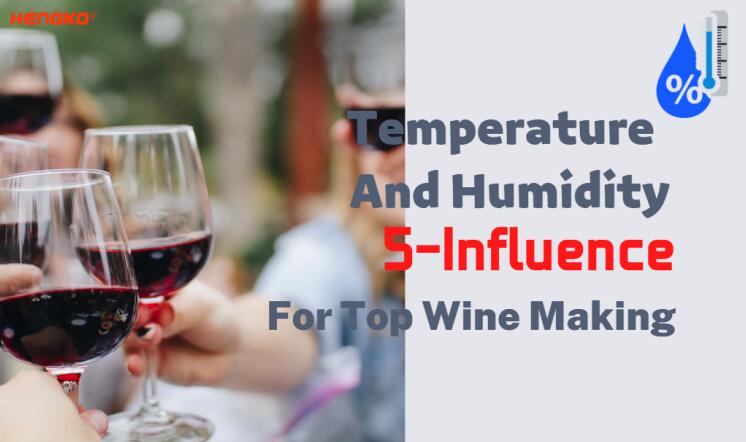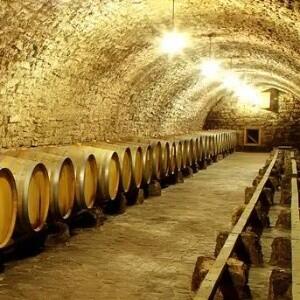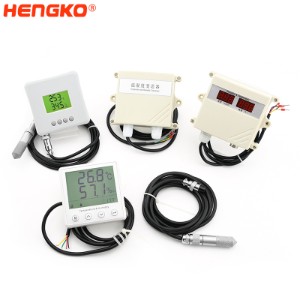
With the improvement of modern taste in life, red wine is gradually becoming a common drink in people's lives. There are many details to keep in mind when storing or collecting red wine, so temperature and humidity is a very critical factors. It is said that the perfect temperature can make a good bottle of wine. This undoubtedly makes temperature a major influence on wine, almost as much as the tannins in the grapes. So, what are the effects of temperature on wine?
HENGKO List 5 Important Influence Factors Of Temperature And Humidity On Wine :
1. Growth of Grapes 2. Wine Fermentation 3. Wine Storage 4. Serving Wine 5. Humidity
Let's Check details as follow :
- 1. It Has a Great Influence on the Growth of Grapes.
Generally speaking, the appropriate temperature for grape growth is 10 to 22°C. During the grape growing period, if the temperature is too low, it can affect the ripeness of the grapes, resulting in a pronounced raw green taste, a sour taste, and eventually an unbalanced structure of the wine. In severe cases, the vines cannot perform normal photosynthesis and cannot grow. When the temperature is too high, it speeds up the rapid ripening of the sugars in the wine, but the tannins and polyphenols in the fruit are not fully ripe, which eventually results in a wine with a high alcohol content, an unbalanced taste, and a rough and uncoordinated body. In severe cases, it can cause vine burns and death. Also, during the grape harvest, if the temperature is suddenly too low, it can lead to frostbite, which affects the taste and flavor of the wine. This is why most wine regions are located between 30 and 50° north and south latitudes.
- 2. Effect on Wine Fermentation.
The fermentation temperature of white wine is usually 20~30 degrees, and the fermentation temperature of white wine is usually 16~20 degrees. During the fermentation process, if the temperature is too low, the growth and fermentation of yeast will become very slow or even suspended, resulting in microbial instability and contamination; slow maceration of red wines, difficulty in extracting pigments, high-quality tannins, and polyphenols, resulting in poor aroma, light, and tasteless taste and inconsistent wine; slow and stopped fermentation results in lower yield and low economic value.
However, if the fermentation temperature is too high, it can also cause slow or suspended yeast fermentation, leaving residual sugar in the wine; may trigger the growth of Lactobacillus and the formation of yeast toxins; destroying the aroma of the wine, making the wine less complex in terms of body and level, and have a high alcohol loss, ultimately causing the wine to be uncoordinated.
- 3. Influences on the Storage of Wine
The best ideal temperature for wine storage is a constant temperature of 10 to 15 degrees. Unstable changes in temperature can make the taste rough and affect the quality of the wine. If the temperature is too low, the wine will ripen very slowly and will have to wait longer. In severe cases, this can cause frost damage to the wine and damage to the aroma and taste of the wine. If the temperature is too high, it will speed up the ripening period, reducing the rich and detailed flavors and decreasing the life of the wine; at the same time, if the temperature is too high, the wine will be fully oxidized, causing excessive oxidation of tannins and polyphenols, causing the wine to lose its aromas and making the palate thin or even inedible. Hengko's temperature and humidity transmitters can instantly monitor temperature changes in your wine cellar.
- 4. Effects on Serving Wine
When serving wine, it is important to pay attention to the temperature of the wine to avoid shortcomings of the wine and to highlight the characteristics of different styles of wine. The temperature of any wine should not be too low because too low a temperature will suppress the release of aromas in the wine, but an increase in temperature will also cause the wine to lose its fruity aroma, but will improve the wine's aroma, speed up the wine's oxidation reaction, soften the tannins and make the taste round and soft; in addition, an increase in wine temperature will enhance the acidity.
As for red wine, if the serving temperature is too low, it will cause the aroma to be closed, the acidity to be reduced and the taste to be too astringent. For white wine, too low a drinking temperature will cause the aroma of white wine to be closed, the freshness of acidity will not be highlighted, and the taste will be monotonous and tasteless. If the drinking temperature is too high, it will highlight the alcoholic taste, cover up the pleasant and strong aroma of the wine, and even cause uncomfortable irritation.
Optimal serving temperatures for some wines:
1) Sweet and sparkling wines: 6 ~ 8 degrees.
2) Light or medium-bodied white wines: 8 to 10 degrees.
3) Medium or full-bodied white wines: 10 to 12 degrees.
4) Rosé wines: 10-14 degrees.
5) Light or medium bodied red wines: 14 ~ 16 degrees.
6) Medium-bodied or above red wines: 16 ~18 degrees.
7) Fortified wines: 16 ~20 degrees.
HENGKO's temperature and humidity sensors can better monitor the temperature of wine for you.
- 5. The Effect of Humidity on the Wine
The influence of humidity acts mainly on the cork. Usually, it is believed that the humidity level should be 60 to 70%. If the humidity level is too low, the cork will dry out, affecting the sealing effect and allowing more air to reach the wine, speeding up the oxidation of the wine and causing it to deteriorate. Even if the wine does not deteriorate, the dry cork can easily break or even shatter when the bottle is opened. At that time, a lot of disdain will inevitably fall into the wine, which is a bit annoying. If the humidity is too high, sometimes it is not good either. Cork tends to get moldy. In addition, it is easy to breed beetles inside the cellar, and these beetle-like lice will chew the cork and the wine will spoil.
Hengko's Temperature and Humidity Transmitter can solve your wine's problems caused by temperature and humidity changes. Contact us for more information.
Also You Can Send Us Email Directly As Follow : ka@hengko.com
We Will Send Back With 24-Hours, Thanks for Your Patient !
Post time: Sep-09-2022








